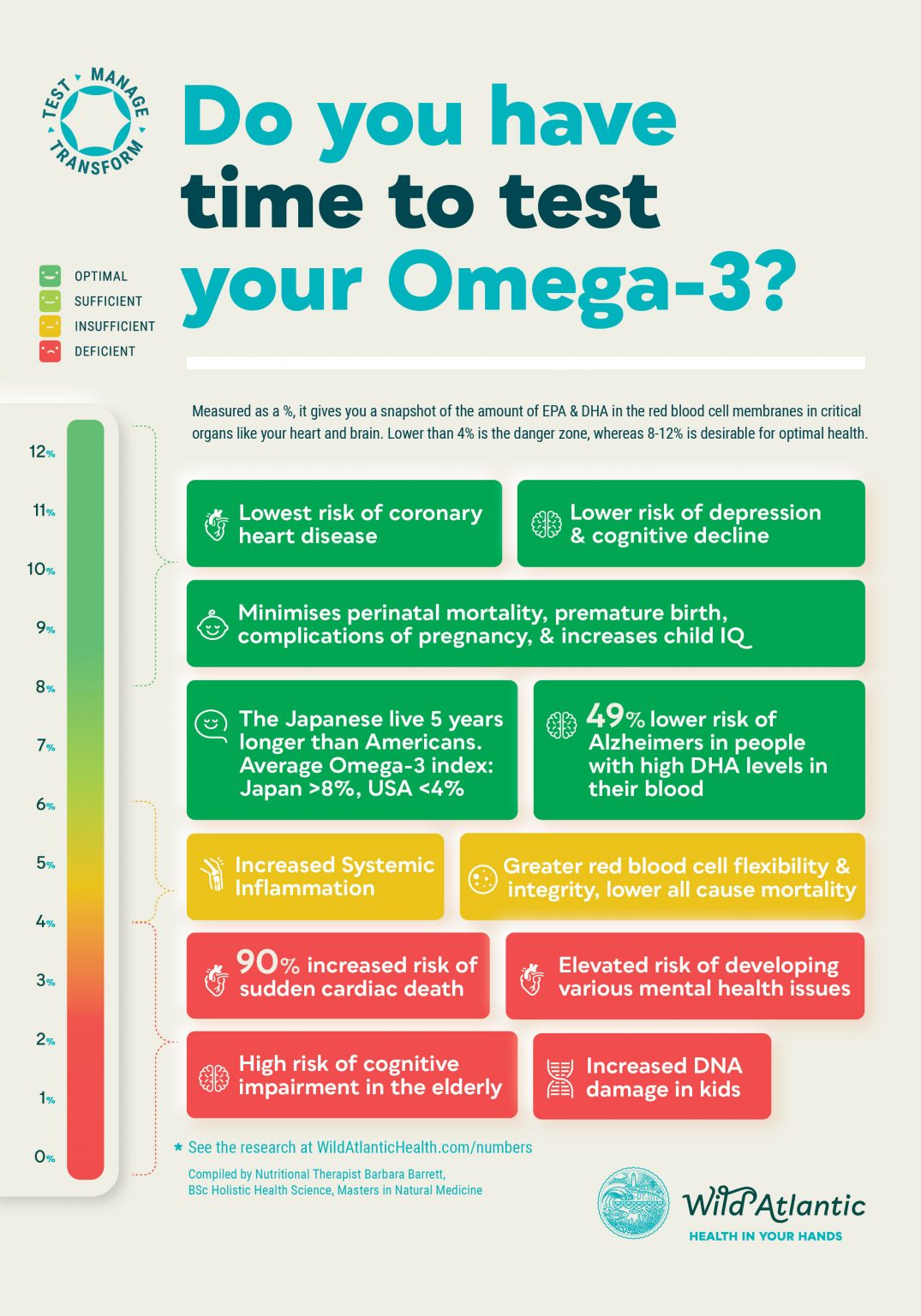Omega-3 fatty acids are essential for good health, and testing for these fatty acids is an important way to assess and improve overall health.
This article provides an overview of the importance of fatty acids, signs and symptoms of low essential fatty acids, pricing of EFA blood tests, how to optimize omega-3 levels, research resources, interesting facts, reviews, and an award-winning omega-3 testing kit from Wild Atlantic Way.
Key Takeaways
- Essential fatty acids, including omega-3 fats, have numerous benefits for the heart, brain, eyes, and joints.
- The Essential Fatty Acids test can assess the balance of essential fats in the body and help identify the need for supplementation or dietary modification.
- Omega-3 fats play a crucial role in reducing chronic inflammation and are associated with a lower risk of heart disease, plaque build-up, and heart attacks.
- The Omega-3 Advanced Test Kit provides comprehensive information about omega-3 levels in the body and can guide diet, health, and lifestyle improvements.

Role of Fatty Acids
Omega-3 fatty acids are essential for human health. They include alpha-linolenic acid (ALA), eicosapentaenoic acid (EPA), and docosahexaenoic acid (DHA). Omega-3 fatty acids are essential for the proper functioning of cells, brain health, and metabolism.
In addition, a healthy balance of Omega-3 and Omega-6 fatty acids is necessary for optimal health.
Introduction to Omega-3: ALA, EPA, and DHA
Essential fatty acids, such as alpha-linolenic acid (ALA), eicosapentaenoic acid (EPA), and docosahexaenoic acid (DHA), have been shown to possess various health benefits. ALA is found in plant-based foods, while EPA and DHA are found in animal-based foods.
ALA is converted into EPA and DHA in the body, but the conversion rate is low. Supplementation with EPA and DHA is therefore important for optimal health.
Studies suggest that EPA and DHA can reduce inflammation, reduce the risk of chronic diseases, and improve brain and cardiovascular health.
Importance in cell function, brain health, and metabolism
Studies have shown that essential fatty acids have a range of beneficial effects on cell function, brain health, and metabolism. Omega-3s play an important role in reducing chronic inflammation, which is linked to numerous diseases.
Omega-3s are found in cell membranes and affect gene expression, contributing to cellular metabolism, immune system function, and cardiovascular health. EPA, DHA, and DPA have anti-inflammatory effects, unlike pro-inflammatory Omega-6s.
Supplementation can help restore the balance between Omega-3s and Omega-6s, reducing inflammation and the risk of chronic diseases.
Omega-3 vs. Omega-6 balance
Our ancestors consumed a diet that provided equal proportions of Omega-3s and Omega-6s. However, the Western diet has led to an increased consumption of Omega-6s from refined processed foods. This has caused an imbalance between the two fatty acids. Specifically, Linoleic acid from Omega-6s converts to arachidonic acid (AA), which promotes inflammation.
Experts recommend a 3:1 balance between Omega-6 and Omega-3 fatty acids. Unfortunately, 95% of people are at risk of an imbalance, with ratios as high as 25:1. To restore this balance and reduce inflammation, Omega-3 supplementation can be helpful.
Signs and Symptoms of Low Essential Fatty Acids

Low levels of essential fatty acids can have a variety of symptoms.

Skin issues such as dryness, eczema, and hair loss may be present.

Neurological symptoms may include mood swings, memory problems, and poor concentration.

Dry eye syndrome and poor night vision can be signs of low essential fatty acids.

The immune system may be weakened, leading to an increased susceptibility to infections.

Cardiovascular symptoms include poor circulation and an irregular heartbeat.
Research suggests that increased levels of omega-3 fatty acids may help reduce mood swings and improve memory. Low levels of essential fatty acids in the body are associated with neurological issues such as depression, anxiety, and irritability.
Omega-3s are known to increase brain levels of serotonin, which can help reduce mood swings and improve cognitive function. Studies have also found a connection between omega-3 fatty acids and improved memory.
Supplementation may be beneficial for those with low levels of essential fatty acids.
Skin issues: Dryness, eczema, hair loss
Omega-3 fatty acids are essential for healthy skin, as they help regulate skin moisture, reduce inflammation, and support the production of new cells.
Studies show that a lack of omega-3s can lead to dry skin, eczema, and even hair loss.
Research suggests that omega-3 supplementation can help improve skin health, reduce the risk of skin issues, and boost hair growth.
It is important to consult with a doctor or nutritionist to determine the best approach for optimal omega-3 intake.

Immune system: Increased susceptibility to infections
Studies have indicated that an imbalance between omega-3 and omega-6 fatty acids may increase susceptibility to infections and a weakened immune system.
Omega-3 fatty acids have anti-inflammatory properties that help reduce inflammation and improve immune function.
Studies have found that individuals with lower levels of omega-3 fatty acids are more prone to infections, such as the common cold.
Supplementing with omega-3 fatty acids may strengthen the immune system and reduce the risk of infections.
Cardiovascular: Poor circulation, irregular heartbeat
Evidence suggests that inadequate omega-3 fatty acid intake may contribute to poor circulation and an irregular heartbeat. A diet low in omega-3s can decrease the amount of oxygen-rich blood in organs and tissues and reduce heart rate variability.
Omega-3s can also help reduce inflammation, lower triglycerides, improve cell membrane function, and improve blood flow.
Supplementation or dietary modification may be necessary to improve omega-3 levels and reduce the risk of cardiovascular complications.


Eyes: Dry eye syndrome, poor night vision
Adequate levels of omega-3 fatty acids may help reduce the symptoms of dry eye syndrome and improve night vision. Studies show that omega-3s are important for the production of tears and proper eye lubrication, which can reduce dryness.
Additionally, omega-3s have been linked to improved night vision, as they help the eye adjust to dark environments and reduce light sensitivity.
Supplementing with EPA and DHA can help improve eye health and reduce the risk of vision deterioration.
Optimise Your Omega-3 Levels
The importance of maintaining balanced levels of essential fatty acids in the body have been widely studied and documented. Dietary recommendations for increasing omega-3 levels include increased consumption of fatty fish, as well as plant-based sources of omega-3s. Supplementation guidelines should consider quality, dosage and regular testing, as well as other considerations.Importance of maintaining balanced levels
Maintaining balanced levels of essential fatty acids is important for reducing inflammation and lowering the risk of chronic diseases. Unbalanced ratios of Omega-3 and Omega-6 fatty acids can increase inflammation, promote chronic diseases, and lead to a range of health issues.
To optimise levels, it is essential to:
- Track Omega-3 levels with a blood test.
- Analyse dietary intake of essential fats.
- Consider supplementing with Omega-3s.
- Consult with a nutritionist or naturopath.
Dietary recommendations: Increasing fish intake, plant-based omega-3s
Increasing intake of fish and plant-based omega-3s is recommended to improve levels of essential fatty acids. Consuming fatty fish, such as salmon, mackerel, sardines, and herring, is a good source of EPA and DHA. Plant-based sources, such as flaxseeds, walnuts, and chia seeds, contain ALA, which the body converts to EPA and DHA.
Omega-3 supplements can also be taken to ensure adequate levels are maintained. Dietary modifications may be necessary to ensure that an appropriate balance of essential fatty acids is achieved.
Supplementation guidelines: Quality, dosage, and regular testing
When supplementing with essential fatty acids, it is important to consider the quality, dosage, and regularity of testing.
- Quality supplements should be approved and certified by a trusted source.
- Dosage should be consistent with the recommended dietary allowances.
- Testing should be done regularly to monitor levels.
- These measures help ensure optimal levels of essential fatty acids in the body.
Research Resources
Research into the benefits of Omega-3 essential fatty acids and deficiencies has been conducted extensively over the past decades. Clinical trials have demonstrated the potential of Omega-3 supplementation to reduce the risk of chronic diseases and improve overall health.
Studies have also shown that optimal levels of Omega-3 fatty acids are necessary for normal brain development, mental function, and physical health.
Key studies on Omega-3 benefits and deficiency
Numerous studies have documented the health benefits of Omega-3 fatty acids and the risks associated with deficiency.
- The Omega-3 Index: a new risk factor for death from coronary heart disease? – link
- HS-Omega-3 Index and psychiatric diseases – link
- Cognitive Impairment Is Associated with a Low Omega-3 Index in the Elderly: Results from the KORA-Age Study – link
- Omega-3 Fatty Acids in Pregnancy—The Case for a Target Omega-3 Index – link
- Polyunsaturated fatty acid levels of serum and red blood cells in apparently healthy Japanese subjects living in an urban area – link
- Can a High Omega-3 Level Add Years to Your Life? New Research Says Yes! – link
- Red Blood Cell DHA Is Inversely Associated with Risk of Incident Alzheimer’s Disease and All-Cause Dementia: Framingham Offspring Study – link
- The omega-3 index is inversely associated with the neutrophil-lymphocyte ratio in adults – link
- Omega-3 index is directly associated with a healthy red blood cell distribution width – link
- Cardiovascular benefits of omega-3 fatty acids – link
- Omega-3 fatty acids and mental health – ScienceDirect – link
- Cognitive Impairment Is Associated with a Low Omega-3 Index in the Elderly: Results from the KORA-Age Study – Abstract – link
- New Study Shows Kids with Higher Omega-3 Levels Have Healthier DNA – link
Interesting Facts
Omega-3 fatty acids have been studied since the 19th century, but it was not until the 1970s that their health benefits were widely recognized.
Today, Omega-3s are consumed in large quantities around the world, but the highest levels of consumption are found in countries with cold climates, such as Norway and Iceland.
This suggests a correlation between dietary Omega-3 intake and the health benefits associated with them.
Historical context of Omega-3 discovery
It is believed that the health benefits of Omega-3 fatty acids were first recognized in the mid-1800s. In 1876, a German scientist observed that the Eskimos consumed a diet high in fish and had fewer cases of heart disease. This prompted further research into the effects of Omega-3 fatty acids on the human body.
Over time, the understanding of the importance of Omega-3 fatty acids in health and disease has grown.
- Omega-3 fatty acids reduce inflammation and blood clots.
- They are important for brain development and mental function.
- They reduce the risk of heart complications.
- They support cardiovascular health.
Geographic distribution of Omega-3 consumption
Omega-3 fatty acids were first discovered in the early 1900s. Since then, its presence has been studied across the world and reveals wide geographic variations in consumption levels.
Studies conducted in Europe and North America have indicated that omega-3 fatty acid intakes are typically lower than those recommended for optimal health. In regions of the Middle East, Asia, and Africa, however, the consumption of seafood, which is a rich source of omega-3s, is higher and the levels of omega-3s are higher.
This suggests that dietary patterns and cultural customs play an important role in the consumption of omega-3 fatty acids.
Reviews
Reviews of Omega-3 sources often include personal experiences, benefits observed, and recommendations. Thus, it is important to consider these reviews when deciding on the best source for Omega-3 supplementation.
Frequently Asked Questions

How Do I Know if I Have an Omega-3 Deficiency?
Signs of omega-3 deficiency include dry skin, fatigue, poor memory, and mood swings. Blood tests can help identify an omega-3 deficiency by measuring omega-3 levels, as well as the ratio of omega-6 to omega-3 fatty acids. Consulting a health professional can help provide a diagnosis and treatment plan.
What Foods Are High in Omega-3 Fatty Acids?
Foods high in omega-3 fatty acids include cold-water fish, flaxseed, walnuts, chia seeds, hemp seeds, and canola oil. Additionally, some plant-based foods, such as Brussels sprouts, spinach, and kale, are good sources of omega-3 fatty acids.
How Much Omega-3 Do I Need to Take for Optimal Health?
Omega-3 intake recommendations vary based on age, health status, and lifestyle. Generally, it is recommended to consume 250-500 mg of EPA and DHA per day for optimal health. Consultation with a healthcare provider can help determine an individual’s specific needs.
Are Omega-3 Supplements Safe for Everyone?
Omega-3 supplements are generally safe for most people when taken at recommended doses. Certain subgroups, such as pregnant women, may need to consult with a healthcare provider before taking omega-3 supplements. It is important to follow the label instructions and take only the recommended amount.
Are There Any Side Effects of Taking Omega-3 Supplements?
Omega-3 supplements are generally considered safe when taken in recommended doses. However, some potential side effects include gastrointestinal upset, increased bleeding risk, and interactions with certain medications. Consulting with a healthcare provider is recommended before taking omega-3 supplements.
Conclusion
In conclusion, testing for Omega-3 fatty acids can provide an accurate and convenient way to measure essential fatty acids in the blood. By optimizing Omega-3 levels, individuals can reduce the risk of chronic diseases, improve mood and cognitive function, and gain insight into their Omega-3 Index, AA:EPA ratio, and Omega-6:Omega-3 ratio.
With the Omega-3 Advanced Test Kit, individuals can have a convenient and private test done from the comfort of their home. Through testing for Omega-3 fatty acids, individuals can ensure they are getting the essential fatty acids needed for optimal health.






























